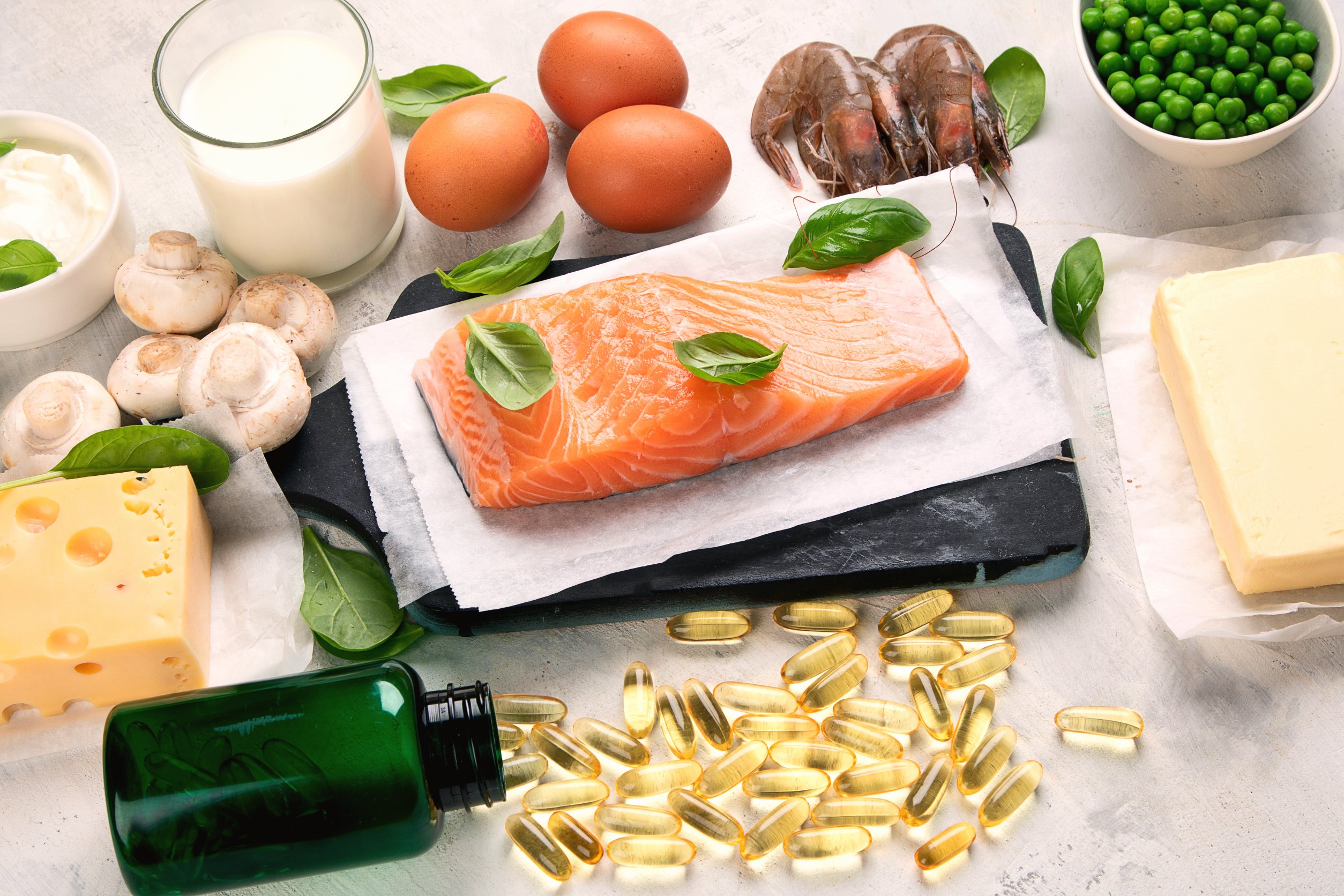”Utah, do you experience PTSD symptoms or have a loved one who does? We know that this is a common experience in our community. This week's article discusses the role nutrition plays in symptom management. We hope you find this helpful.
Reading time: 5 Minutes
MWi Hack:
- Learn about how nutrition can help alleviate PTSD symptoms
MWi Summary:
- Symptoms of PTSD include hyper-vigilance and/or avoidant behavior.
- Current PTSD treatment guidelines include CBT and/or anti-depressants. Self-care actions have proven to be effective treatments as well, to include eating well.
- A healthy diet that could help manage PTSD symptoms include avoiding refined/processed sugars, increasing micronutrient intake, increasing probiotic/prebiotic levels, and supplementing with omega-3s.
- When making any dietary changes, it is important to keep self-compassion in mind and remembering that eating well is a powerful act of self care.
Post Traumatic Stress Disorder (PTSD)
About Post Traumatic Stress Disorder (PTSD)
PTSD is a mental health condition that can be caused by a frightening or life threatening event. Originally a term used to describe the traumatised state of some returning war veterans, it is now understood that a variety of traumatic situations can cause PTSD, such as accidents, crime, disasters, childbirth or family or partner abuse. After experiencing a dangerous situation people can have strong feelings of panic, anger or remember vivid images, however most often these sensations fade after a few months. However it is estimated that 20% of people who suffer a trauma can go onto develop PTSD, where these symptoms persist.(1)
Symptoms of PTSD
Often people suffer from flashbacks, vivid nightmares or unwanted memories. They may feel hypervigilant in their everyday lives, particular if there are sounds, sights or smells that remind them of the incident. This can also lead to avoidant behaviour, not going to certain places or avoiding situations. If triggered by something in their environment that connects them to the traumatic memory, they can either feel suffused with panic, fear, shame or anger, or equally feel cut off from emotions and experience numbness and disassociation.
What causes PTSD
Why an individual develops PTSD is not fully understood. It can for example relate to the length of time the trauma persisted, or the severity of the experience. There is some evidence to suggest genetic susceptibility plays a role, yet equally the amount of support an individual receives from their family and friends has been shown to ameliorate its development. The repeated ‘hyperarousal’ that the individual experiences after the event suggests that it may be the body’s over vigilant way of reminding them to stay safe. However this suffusion of the stress hormones cortisol and adrenaline, are not only distressing for the individual but the persistent release of stress hormones have unintended consequences to their health.
Support for PTSD
NICE guidelines recommend trauma focused therapies such as CBT, counselling or EMDR and/or pharmacological support in the form of anti-depressants in the treatment of PTSD (2). Though it may appear that PTSD is a mental health condition and therefore solely a concern of the mind, the brain and our body responds and holds onto memory and what has been experienced. A demonstration of this was given by a study (3 and 4) which used MRI brain scans of traumatised individuals which showed that there was little activation of the medial prefrontal cortex, the anterior cingulate, the parietal cortex or the insula. These brain regions are described as the self-sensing areas and the supposition is that individuals may shut down visceral feelings, in effect numbing their connections to their body in response to trauma. Eating well therefore is a vital part of self care, which can be augmented with other beneficial activities that ground an individual into bodily experiences, such as:- yoga, breathwork, singing or walking in nature.
Effects of Cortisol on appetite
When suffering from PTSD it can also feel difficult to either regulate emotions or to know what emotions you are experiencing. Sometimes in an attempt to feel better, research has shown that PTSD sufferers will turn to comfort food (5). There may be a desire for processed foods such as chips, cakes, biscuits and ice cream. Whilst the spike in sugar levels of these foods offers a temporary feel good response, it only lasts a brief time. Cravings may happen quite unconsciously as the actions of cortisol, a stress hormone produced in the adrenal glands, prompts feelings of hunger. Cortisol is also implicated in increasing the amount of fat which is stored in the stomach, and excess cortisol can drive feelings of hunger for sweet, fat-rich foods. Equally, low cortisol is also possible with PTSD, the result of which is tiredness, difficulty getting up in the mornings and conversely feeling no appetite whatsoever.
Key actions: Cortisol levels can be checked by your GP. You can also raise your own awareness of your eating patterns and support yourself to regulate them. Research has shown that meal patterning is important in helping us regulate our eating, whether that is eating too little or too much due to stress (6). Think about reinstating three meals a day, and reduce snacking. It is the snacks that tend to include sugars, salts and refined carbohydrates. If you are prone to impulsive eating late at night, always have some healthy snacks available instead, such as brazil nuts, bananas or berries.
Balance blood sugar levels
A sugar rich diet will also cause insulin fluctuation, which in turn can make emotional responses and moods feel more intense. Processed foods such as biscuits, cakes, and sweets are quick to be broken down by the body into glucose, which causes a sugar spike. Equally there is research that suggests eating too much sugar decreases our B vitamins. Therefore it is important to be kind to yourself and support oneself to swap momentary pleasure to a more sustaining healthier diet which could help regulate mood.
Key Actions: Cut down on sugar and processed foods and replace them with more complex carbohydrates, such as wholegrain bread, porridge or brown rice. It is helpful to eat what is called a low Glycemic Load (GL) diet that avoids sugar and refined carbohydrates. Ensure your diet includes whole grains, seeds, nuts and berries with lots of green leafy vegetables and salads. Good sources of protein are important too, such as lean chicken or fish. Equally, it is not necessary to avoid fats, just eat the good ones, such as those found in avocados, walnuts or oily fish. Mindful eating could help too, as it involves slowing down the act of eating and being aware of your food, increasing enjoyment of all the healthy things you are eating.
Increase multivitamin and mineral intake
When an individual’s body undergoes extreme stress, it is understood that their need for micronutrients increases. Whilst biomarkers such as blood tests can pinpoint particular deficiencies, there is also a synergistic effect of many vitamins (for example Vitamin C is important for good iron absorption) meaning that there is a benefit to take them in combination with each other. Vitamin D is often called the ‘feel good’ vitamin, is of particular importance to our wellbeing. A study of PTSD participants found 62.7% were deficient in Vitamin D (7). Additionally a preventative study in New Zealand showed that there appeared clinically significantly less psychological distress shown by survivors of the 2010 earthquake as well as the 2019 mosque shooting by survivors who supplemented their diet with multivitamins and minerals following the events (8).
Key Actions: If you are suffering symptoms of tiredness or fatigue, it may be good to consult your GP for blood tests to check your micronutrient levels, though there are some vitamins that it is more difficult to check accurately. Consider supplementing your diet with a good multivitamin and mineral tablet. In winter particularly in the UK, our vitamin D levels can become low. This is because we need the sun on our skin to boost our levels. Ensure your multivitamin includes Vitamin D, or add Vitamin D too if you’re not getting enough sunshine.
Consider prebiotics and probiotics
A study on the gut microbiome of US veterans suffering from high levels of PTSD concluded there were alterations in the gut microbiota (9). The development of cardiovascular disease among the cohort was equally heightened in those with sparser microbiota populations. Largely there is consensus that stress can cause gut dysbiosis, and that the mechanisms involved in this interplay relies on the role of the vagus nerve. The vagus nerve is a long nerve that connects parts of the body including the gut to the brain. It controls unconscious body functions such as the digestive system. Therefore if we feel upset, often this can affect our digestion. The gut is lined with neurons, and constitutes our enteric nervous system, meaning that we really do feel things in our gut. Additionally, 90% of serotonin, a powerful feel good neurotransmitter, is created in the gut, and we rely on good bacteria to help break-down our foods, particularly proteins, to produce neurotransmitters.
Key Actions: Carrots, onions, leeks, broccoli, oats, garlic, tomatoes and lentils, are rich in fibre and naturally contain prebiotics. Therefore ensuring you have a good supply of fibre and fresh vegetables and fruit, will help to support your gut microbiome. If you do decide to take a probiotic, check the levels of bacteria provided are significant, and that they are strains that can survive stomach acid. Some prebiotics such as Lactobacillus Rhamnosus, which appears helpful for anxiety, are better researched than others. However, maintaining a healthy diet rich in fibre ultimately is still key to developing and sustaining a healthy microbiome.
Omega 3 supplementation
There is sufficient evidence to suggest that Omega 3 fatty acids are beneficial not just for physical health, but for mental health too (10). Fish oil contains EPA and DHA, which are vital to support our neuronal function. Whilst there are no rct trials related to PTSD, evidence exists to support its use in other conditions such as depression and bi-polar disorder. However, one trial showed evidence to suggest that fish oil could be beneficial in preventing PTSD. Following the East Japan earthquake, rescue workers were involved in a random parallel group trial of fish oil (11). Whilst there appeared little benefit for men, it did appear much more beneficial in reducing PTSD symptoms in women. There appears to be a higher incidence of depression if an individual is deficient in omega 3 fatty acids, however if there is no existing deficiency, supplementation may have no effect (12). However COMA (Committee of Medical aspects of Food policy) reportz that the average protein intake from fish is currently only 7%, which suggests there could be insufficiency within the UK population generally, particular as a typical western diet is biased towards omega 6.
Key Actions: Try to eat two to three portions of oily fish (such as mackerel, sardines or salmon) a week. If you do not eat fish regularly, then look for a good quality fish oil to supplement your omega 3 intake. If you’re vegan or vegetarian, alternatives can be found in seaweed, algae, walnuts, linseed or flaxseed.
Reduce Homocysteine levels
When our bodies are in a state of stress for prolonged periods of time, our homocysteine levels in our blood can become elevated. There is evidence to suggest that elevated homocysteine doesn’t just cause physical problems such as increased risk of cardiovascular disease, but also aggravates mental health difficulties (13). Eating a healthy diet that is rich in vegetables such as: broccoli, kale, spinach, cabbage as well as citrus fruits and pulses like black eyed beans and chickpeas, will help to boost your B vitamins. If you feel you are not eating five a day fruit and vegetables, look for foods fortified in Vitamin B6, B12 and folic acid.
Key Actions: Increase your consumption of fresh leafy vegetables. Shopping in farmers markets or new places will help introduce you to interesting varieties of vegetables such as curly kale, purple broccoli, and exotic fruits. Exploring new cookbooks will increase your range of recipes and help you to be adventurous in how you cook green leafy vegetables.
Foods and Inflammation
Bessel van de Kolk has worked extensively with victims of trauma and cites research in “The body keeps the score” (14) that demonstrates abnormalities in CD45 cells RA to RO ratio. CD45 cells are sometimes called the memory cells of the immune system. The implication is that the primed CD45 RA cells express, just as an individual may feel psychologically primed for attack, so it appears are their digestive systems. Whilst our gastro intestinal tract needs to recognise pathogens from beneficial non-self molecules, CD45 cells defensive actions can prove over-zealous and could lead to food intolerances. When antigens breach the lumen mucosal layer the cells become primed, and when an individual ingests that food again, their body remembers and intolerances build up. Some foods such as the gluten (gliadin) in bread, or the lactose in milk are more likely to cause intolerance responses. However, it is important to check this out for example with a coeliac test. (Please note you have to be including gluten in your diet at the time of testing for the results to be accurate). However, for those who have already developed an autoimmune disease (such as a thyroid issue), there is a higher prevalence of non-coeliac gluten sensitivity (NCGS) which may not be picked up with a test. Nevertheless, if the individual is experiencing digestive issues because of gluten, then it is better to avoid. This is because gut inflammation leads to increased pro-inflammatory markers and cytokines in the body. As Edward Bullmore asserts in his book “The Inflamed Mind”(15), there appears a correlation between bodily inflammation and mental health.
If you have tested negative for celiac disease, but still experience distress when eating wheat or gluten or any other foods, you may benefit from talking to a nutritionist regarding how to embark on an elimination diet. NICE guidelines currently recognise that diagnosis of NCGS is far from perfect and is a research priority.
Key Actions: If you suspect a gluten intolerance, speak to your GP about a coeliac test. If you are unsure as to what is causing the digestive issue, investigate your diet with the professional help of a Dietitian or Nutritionist. Do not be tempted to rule out entire food groups without getting professional advice. Become familiar with anti-inflammatory foods such as olive oil, green leafy vegetables and interesting spices such as turmeric. Tune into what agrees with you and listen to your body.
Magnesium
There is evidence to suggest (16, 17) that the reliance on the western diet in the UK puts individuals at risk of magnesium deficiency. This is because processed foods contain very little magnesium. Magnesium sufficiency is particular relevant for individuals suffering from PTSD: not enough magnesium will increase pro-inflammatory markers in the body. As discussed previously, chronic low level inflammation is implicated in depression and anxiety. Additionally, magnesium deficiency is linked to a higher prevalence of diabetes and cardiovascular disease.
Key Actions:ensure you include in your diet lots of green leafy vegetables such as spinach, nuts and seeds, and fish such as tuna. Getting enough magnesium is best achieved synergistically within an overall healthy diet, but if you are struggling to get enough, consider supplementation.
Finally, be kind to yourself. Think about using your food to increase enjoyment. Eating well is a powerful act of self-care towards yourself at a time when you really need it. Cooking can be fun and an engrossing mindful activity and your dietary choices, as are you, are important.
Researched by: Geraldine Marsh MA, Pg Dip MBACP Reg. Psychotherapist.
Technically Checked by: Alice Benskin, MSc
MWi would like to thank Food For the Brian Foundation for sharing these important insights with our community. Hit the button below to go to the original article:






